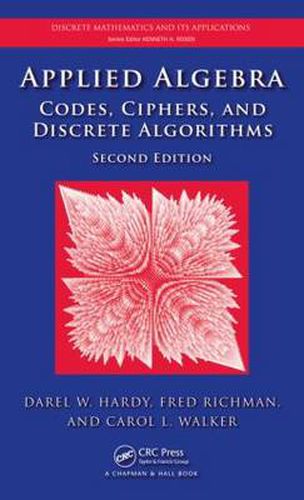Readings Newsletter
Become a Readings Member to make your shopping experience even easier.
Sign in or sign up for free!
You’re not far away from qualifying for FREE standard shipping within Australia
You’ve qualified for FREE standard shipping within Australia
The cart is loading…






Using mathematical tools from number theory and finite fields, Applied Algebra: Codes, Ciphers, and Discrete Algorithms, Second Edition presents practical methods for solving problems in data security and data integrity. It is designed for an applied algebra course for students who have had prior classes in abstract or linear algebra. While the content has been reworked and improved, this edition continues to cover many algorithms that arise in cryptography and error-control codes. New to the Second Edition A CD-ROM containing an interactive version of the book that is powered by Scientific Notebook®, a mathematical word processor and easy-to-use computer algebra system New appendix that reviews prerequisite topics in algebra and number theory Double the number of exercises Instead of a general study on finite groups, the book considers finite groups of permutations and develops just enough of the theory of finite fields to facilitate construction of the fields used for error-control codes and the Advanced Encryption Standard. It also deals with integers and polynomials. Explaining the mathematics as needed, this text thoroughly explores how mathematical techniques can be used to solve practical problems. About the Authors Darel W. Hardy is Professor Emeritus in the Department of Mathematics at Colorado State University. His research interests include applied algebra and semigroups. Fred Richman is a professor in the Department of Mathematical Sciences at Florida Atlantic University. His research interests include Abelian group theory and constructive mathematics. Carol L. Walker is Associate Dean Emeritus in the Department of Mathematical Sciences at New Mexico State University. Her research interests include Abelian group theory, applications of homological algebra and category theory, and the mathematics of fuzzy sets and fuzzy logic.
$9.00 standard shipping within Australia
FREE standard shipping within Australia for orders over $100.00
Express & International shipping calculated at checkout
Using mathematical tools from number theory and finite fields, Applied Algebra: Codes, Ciphers, and Discrete Algorithms, Second Edition presents practical methods for solving problems in data security and data integrity. It is designed for an applied algebra course for students who have had prior classes in abstract or linear algebra. While the content has been reworked and improved, this edition continues to cover many algorithms that arise in cryptography and error-control codes. New to the Second Edition A CD-ROM containing an interactive version of the book that is powered by Scientific Notebook®, a mathematical word processor and easy-to-use computer algebra system New appendix that reviews prerequisite topics in algebra and number theory Double the number of exercises Instead of a general study on finite groups, the book considers finite groups of permutations and develops just enough of the theory of finite fields to facilitate construction of the fields used for error-control codes and the Advanced Encryption Standard. It also deals with integers and polynomials. Explaining the mathematics as needed, this text thoroughly explores how mathematical techniques can be used to solve practical problems. About the Authors Darel W. Hardy is Professor Emeritus in the Department of Mathematics at Colorado State University. His research interests include applied algebra and semigroups. Fred Richman is a professor in the Department of Mathematical Sciences at Florida Atlantic University. His research interests include Abelian group theory and constructive mathematics. Carol L. Walker is Associate Dean Emeritus in the Department of Mathematical Sciences at New Mexico State University. Her research interests include Abelian group theory, applications of homological algebra and category theory, and the mathematics of fuzzy sets and fuzzy logic.